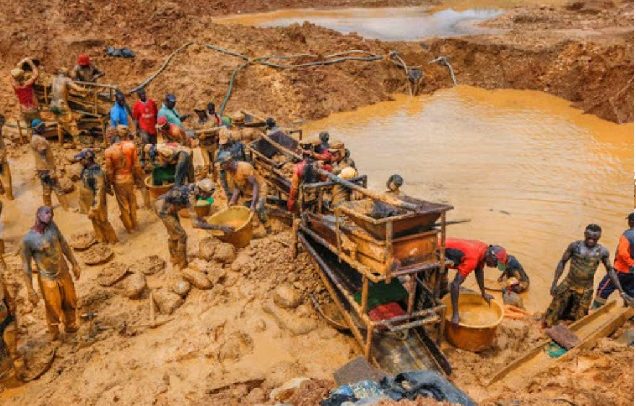EVERYONE in Ghana knows that the answer to the galamsey problem is to end it once and for all.
And indeed, several “operations” have been put into practice for that purpose.
“Operation Vanguard (1) gave way to “Operation Vanguard” (2) which gave way to “Operation Halt” (1) which has now.
That too was replaced with “Operation Halt” (2).
Why? We weren’t told.
In some countries, these changes in nomenclature with regard to the same objective would have been greeted with hysterical laughter. For if (1) did not succeed, why should (2)? And as for changing the name of the “operation” from “Vanguard” to “Halt” and append the same (1) and (2) sub-classifications to them again – does it not reek of confusion?
Yes, if you entrust the solution of a socio-political problem to bureaucrats, you are presented with a “Set of Rules and Numbers”. So, when asked, “What are you doing about excavators engaged in galamsey”? Quick as a flash comes the answer: “Oh, Section Q A Subsection A Q of Act 995” is a deterrent to that. Ahem!
Well, it appears that some chiefs in the country, stung by the bad publicity they have received since they attempted to punish one man and a radio station on which he had made remarks regarded by the chiefs as showing contempt towards them, are now telling off members of the Government. For instance:
QUOTE: “Some chiefs in the Ashanti Region have refuted claims that traditional leaders have a hand in illegal mining activities. According to them, politicians should be blamed for the persistence of the canker and not them.
“This position [emerged at] a dialogue held [with] the Deputy Lands and Natural Resources Minister, George Mireku Duker, [who] had emphasised the role of chiefs in ending the menace, at a gathering…
“Taking their turn to address the Minister, the chiefs [acknowledged] that as custodians of lands, they can order illegal mining to stop. However, their powers have been overridden by some politicians.
According to them, political figures are fuelling the menace by giving licences to miners, who, in turn, destroy the environment and their deities.
“All of us gathered here know those polluting our water bodies. We can’t deny that. Every land in Ghana has a custodian [and] if we decide to ban mining on our water bodies, it will end. .. Our cocoa farms and forests have been destroyed because of you politicians. The miners come with licenses from you and they are protected by soldiers and police.
[So] now, all our sacred places have been destroyed,” said one queen mother.
But despite being exposed to such views, Mr. Duker predicted that his ministry “will make sure that all water bodies polluted by illegal mining are restored to their natural state by March 2023!!”
Speaking on TV programme, Upfront, the Deputy Minister said the state had “put in fresh measures to ensure that the pollution of the rivers becomes a thing of the past.”
Studies have shown that galamsey, especially on major rivers, “is likely to constrain Ghana into importing water from other countries by 2030.”
However, Mr. Duker insisted that: “what I’m telling you, on behalf of the sector Minister, Mr. Samuel Abu Jinapor, and my good self, is that by March next year (2023), we will have something to show to Ghanaians in terms of getting our river bodies clean.”
The Deputy Minister, upon being asked whether he would resign if his plan failed, said the issue of illegal mining was “not life and death”.
“It’s not life and death,” he retorted. “Ghanaians know and appreciate when you work hard… I’ll make sure that I support my country to protect the river bodies and by March (2023), I’ll have something to show.”
It’s not “life and death”, Mr. Duker? Maybe, not to members of the Government. But to those who have to buy sachet water from roadside hawkers whenever they feel thirsty, it is a “life and death” matter.
What happens when they do not have the forty pesewas charged for sachet water?
When they have drunk the water and they get home and they want to wash their sweat-soaked clothing, where will they get the water from? And how do they take a bath after a hard day’s work?
Anyway, Mr. Duker, is it not rash of you to name March 2030 as the date when the rivers would be cleaned of pollution, when you know the failure that greeted the efforts by the Ministry of Environment, Science and Technology to use drones and modern communications equipment to monitor our rivers and forests, to detect whether excavators were being used on them for galamsey?
What happened to “OPERATION GALAMSTOP”? Did it manage to come even close to ending galamsey? Despite that, you want us to believe that your ministry can do it by March 2030?
Well, I wish your ministry good luck. But let me warn you: you face an unenviable situation. The Minerals Commission, which is the operative arm of your ministry (as far as ending galamsey is concerned), has a long history of neglect regarding crucial anti-galamsey measures.
For instance, please just ask the commission this: “How many times have you taken to Parliament, applications to mine, submitted to you for permits and licences that require ratification by Parliament?
Is it not a constitutional requirement that Parliament should ratify all applications for mining in Ghana?”
And, as for the Government itself, please tell us: How many persons has it prosecuted for offences committed under Act 995, since the Act was given the Presidential Assent in November 2019?”
By CAMERON DUODU

